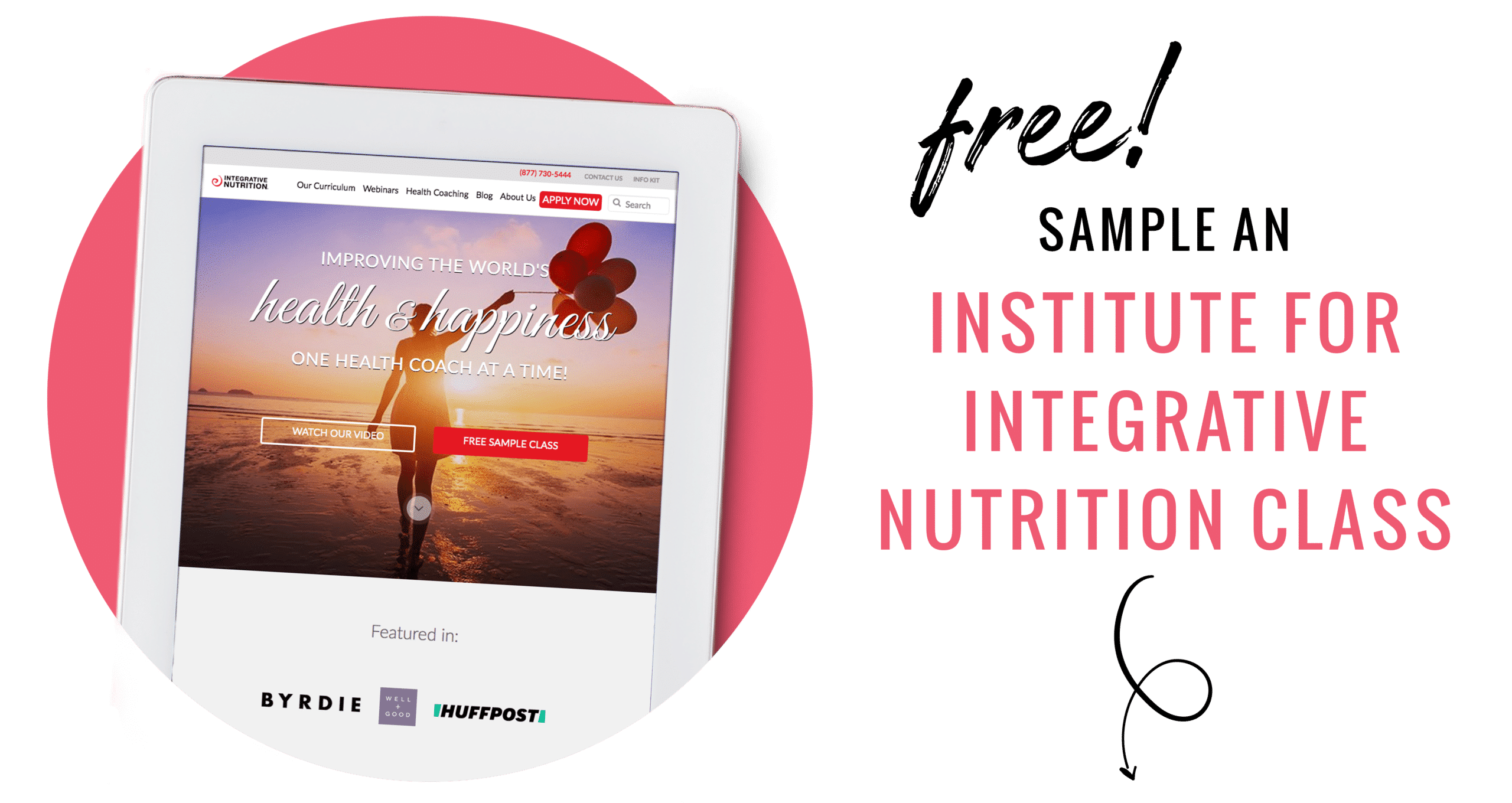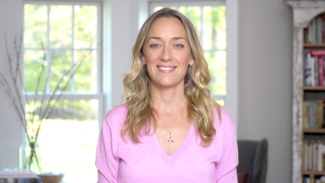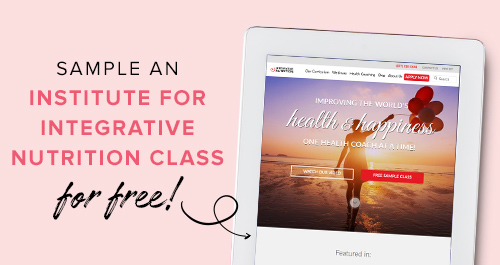Hiya Gorgeous!
I’ve noticed an interesting phenomenon. When people start practicing radical self-care and focusing on their wellness, not only do their own lives change… but they’re motivated to share their newfound knowledge with those around them!
It makes so much sense. When we know better, we do better. And when we do better, we want others to do better, too!
I see this quite a lot with participants from my Crazy Sexy You program and members of my Inner Circle Wellness community. There’s such joy in discovering vibrant health and overall well-being that we naturally end up wanting to lead others in their own healing.
I’m often asked, “Kris, how can I turn this passion for health/food/mindfulness/etc. into a career? What is a health coach and is that something I could possibly do?”
My answer is always an enthusiastic YES! Health coaching is an amazing field that allows you to encourage others to make real, lasting changes in their lives. It’s the perfect complement for folks who already work in the health and wellness space (as yoga or meditation instructors, or life coaches, for example). It also makes a great second career for anyone who wants to bring their vocation more in alignment with their values. There’s nothing as empowering as living out your mission through your work!
Because I know that you might be curious about health coaching, I wanted to take this chance to answer the most frequently asked questions I get, including:
- What is a health coach, exactly? What do they do?
- What qualities make a successful health coach?
- How do I become a health coach? Do I need a degree or certification?
- There are so many options for training out there—how do I know which one to choose?
Ready to dive in? Let’s go!
What is a health coach, anyway?
I love this definition from the Institute for Integrative Nutrition (aka IIN—more on them later!):
“A health coach is a supportive mentor who helps clients make healthy lifestyle choices. Whether the goal is to lose weight, increase energy, or sleep better at night, a health coach motivates individuals to make lasting changes and feel their best.”
In other words, a health coach is not a therapist, a Registered Dietitian or a medical professional. Instead, a health coach is an advocate with specialized training and expertise who can support people who want to improve their health and live a life of wellness.
How amazing is that?! When I was first diagnosed with cancer, I would have loved having a health coach who could help me navigate the confusing, overwhelming world of eating for health and healing. I had to experiment and test everything out myself. It would have been such a relief to have someone guide me through the process, providing the benefit of their experience and wisdom, while allowing me to be in control of my decisions.
And here’s a really cool factoid for ya: In recognition of the valuable work that health coaches perform, the National Board for Health and Wellness Coaching (NBHWC) and the U.S. Department of Veterans Affairs successfully applied for the creation of new Category III CPT codes for health coaching through the American Medical Association (AMA), which went into effect on January 1, 2020.
Now, that’s a mouthful, so let me give you the bottom line in a single word: Validation. The most well-respected medical organization in the US is recognizing the importance of health coaches as well as the growing role health coaches are playing in helping individuals take charge of their own wellness. This is just the beginning!
What does a health coach do?
Health coaches work in a variety of environments, from private practices to coaching for businesses and organizations. Many of my friends who’ve gone through the Institute for Integrative Nutrition program have online business where they coach people online, either individually or in groups.
Here are just a few of the ways you can use your health coaching certification:
- Coach. Join or start your own private coaching practice. You can specialize in weight loss, specific diet modalities, working with a particular population (elderly, athletes, teens, etc.).
- Write. Share your knowledge in your own books or blog, or write for magazines or health and wellness news sites.
- Cook. Develop recipes, create your own meal delivery service or become a personal chef. Yum!
- Educate. Help larger audiences learn about health and wellness by speaking publicly to schools, community groups, businesses, etc.
The possibilities truly are endless!
What qualities make a successful health coach?
Successful health coaches come in all shapes, sizes, ages and backgrounds. There is no single profile that is best. Instead, the most successful health coaches tend to be those who are most passionate about their subject.
I’ve seen great health coaches who were yogis, recovering addicts, just out of college, just retired, former cancer patients, former lawyers and everything in between! (IIN has a great section on their website with stories of their graduates. Check that out here if you’d like some inspiration!)
That being said, there are some qualities that most successful health coaches share:
- They love to share their passion for health, nutrition and wellness.
- They have undertaken their own healing journey and now are moved to help others.
- They’re go-getters and self-starters. They don’t need someone standing over them to make progress.
- They’re empathic and passionate about serving others.
- They love to learn and stay up-to-date on the latest research in their field. They also know that one diet doesn’t necessarily fit everyone.
If this sounds like you, keep reading!
How do I become a health coach?
Currently, the health coaching field is not regulated. Pretty much anyone can call themselves a health coach and start taking people’s money—scary, right?!
Of course, I’m assuming you want to be a legit health coach, someone who has the best interests of your clients at heart. In that case, you’ll want to look into certificate programs.
Certificate programs differ from degree programs in several ways. Certificate programs tend to be narrow in scope, focusing on a specific subject (such as health coaching). Degree programs are typically offered by 2- or 4-year colleges or universities and are broader in scope. As a result, degree programs usually last much longer than certificate programs. IIN, for instance, offers an online health coaching certification program that you can complete in as little as 6 months.
Once you complete the certificate requirements, congratulations! Queue the pomp and circumstance and break out the champagne (or perhaps a green juice mimosa?!)—you’re a certified health coach!
There are so many options for training out there—how do I know which one to choose?
You are absolutely right! There are dozens of options from in-person weekend trainings to months-long online certifications. Selecting one is not something to be done lightly. The organization you choose will have a big impact on your future.
Here are a few questions to ask yourself when choosing a health coaching certification program:
- Do you want an online or in-person program? You may be limited on options for in-person certifications, especially if you don’t live in a major metropolitan area. But even if you have access to a local program, you may want the flexibility of taking courses online. Being able to log in from anywhere certainly has its benefits!
- What is your ultimate goal? Do you want to start your own coaching practice, or are you hoping to score a job with a company or organization? If you want to be hired as a health coach, make sure the certificate you’re considering is accepted by the organization or business you want to work with.
- How much time do you have? Yes, there are weekend and week-long certification programs, but let’s get real. Are you going to be able to learn everything you need to know to be an effective health coach in a weekend or just a few days? Probably not. Of course, a 6-month or year-long program is more of a time investment, but you’ll be rewarded with a deeper level of expertise. Unless you’re just testing the waters to see if you like the field, I suggest foregoing the wham-bam programs in favor of a more comprehensive curriculum.
- What’s the cost? The tuition for health coach certification can be anywhere from a few hundred dollars to thousands. While I’m all in favor of bargain shopping, this is one time when you don’t want to cheap out. You typically get what you pay for with training and education. A higher price tag may seem unnecessary, but look at the sum of the services the program provides in terms of curriculum, quality of instructors, support, job placement/career assistance and more. This can easily translate to a more successful business or career, so make sure you take everything into account.
- How long has the program been around? Just as there are no regulations for health coaches, there are no real regulations for health coach certifications, either. Anyone can start a “program” and hand out certificates. Dig into the background of the program. When did it start? Who are the faculty? Are there any notable graduates? How many people have been through the program? Know what you’re getting into before you commit.
Ok, Kris… what do YOU suggest?
I’m so glad you asked! If you couldn’t tell already, I’m a big fan of the Institute for Integrative Nutrition (IIN).
Not only is IIN the world’s largest nutrition school with over 100,000 graduates from around the world, it’s also been around since 1992 and counts some of my colleagues and mentors as faculty. Mark Bittman, Joel Fuhrman, MD, Bernie Siegel, MD, Andrew Weil, MD, Mark Hyman, MD, and Deepak Chopra, MD are some of my favorites!
IIN’s program is also approved by the National Board for Health and Wellness Coaching (NBHWC), so graduates are eligible to take the NBHWC qualifying exam after successfully completing both IIN’s health coach certification program and their Coaching Intensive Practicum. This additional certification from the NBHWC can be helpful in further identifying yourself as a top-notch health coach.
I also love the flexibility and comprehensiveness of the IIN curriculum. Since everything’s online, it’s easy to tune into classes and keep up with your program. The average student finishes in 6-12 months (which may sound like a long time, but hey, that time’s gonna pass anyway!).
I also believe that IIN’s business and career support is top-notch. Once you’ve completed the certification program, IIN helps you get your business started with their Health Coach Training Program and peer coaching opportunities. You’ll even get your own customizable website with tools to leverage your brand online and marketing materials to help grow your platform!
If I were starting my wellness journey again, I’d begin here.
When I first got my life-changing cancer diagnosis and became a student of my well-being, I read every book and article about holistic nutrition I could get my hands on. But my gut told me I also needed structure and community. At the time, there were only a couple of certifications that resonated with my philosophy, but nothing was in one place. As a result, I had to weave together a curriculum that supported my needs. I took a course here, a program there and many trainings everywhere.
Though I eventually found the right path for me, I did waste time and money with a few detours. I’m glad I stuck with it because a whole world of possibility opened up for a future filled with health, happiness and success. But if I were starting my wellness journey or beginning a career in coaching today, I would strongly consider IIN.
Sample the first week of class for free!
If this has you excited and wanting to learn more about IIN, I have great news—they are inviting you to come on in and take a seat inside their virtual classroom to watch the first week of classes that students go through.
- An introduction to the world of health coaching and the power of food with IIN founder, Joshua Rosenthal, MScEd
- Three lectures exploring the mind-body connection and the importance of self-care
- An overview of the IIN curriculum
I encourage you to check out this sample class here. It’ll give you a taste of what the program is really like so you can make a more informed decision!











I am actually very interested in health coaching, and have been investigating for a few weeks now. I would like to think it could be a post retirement career (I’m still a good ways off from that), and before that something I could do part time and grow. But it’s a big investment! My biggest concern is how and where the certificate is recognized, and how I can use it. Many places are looking for an R.D. degree or license. That is the biggest hurdle for me. I am certainly interested in this training for my own personal knowledge, but with an investment like that, I would also intend to use it financially as well. I would love to feel a sense of purpose and meaning in the work I do, and I have been interested in health and wellness almost all of my life.
Hey Anne! This is Jennifer from Team Crazy Sexy. Good for you for thinking about your future! Health coaching is extremely fulfilling for many. It is an investment, but one that could be life-changing.
As far as accreditation, IIN is recognized by the Department of Education. The Institute for Integrative Nutrition is a member of the National College Credit Recommendation Service (NCCRS) and has been a licensed vocational school by the New York State Education Department since 2009. The faculty is made up of Kris’s colleagues and mentors.
In recognition of the valuable work that health coaches perform, the National Board for Health and Wellness Coaching (NBHWC) and the U.S. Department of Veterans Affairs successfully applied for the creation of new Category III CPT codes for health coaching through the American Medical Association (AMA), which will go into effect on January 1, 2020. This additional certification from the NBHWC can be helpful in further identifying yourself as a top-notch health coach.
The most well-respected medical organization in the US is recognizing the importance of health coaches as well as the growing role health coaches are playing in helping individuals take charge of their own wellness. This is just the beginning!
Students leave the program with a comprehensive nutrition education as well as practical business skills and tools to start a career as a health coach—in fact 74% of grads start their business with clients before they graduate.
Let us know if we can answer any questions, Anne. Or, if you’d like to contact them directly, you can reach them at [email protected] or you can call them directly at US: (877) 730-5444 or International: +1 (212) 730-5433.
Have a wonderful rest of the day! Xo.
Kris, Thank you for this blog!! I am a newbie in the Health Coach world and so excited about the Category III CPT codes! I am getting my masters in Health and Wellness Coaching at the Maryland University of Integrative Health and look forward to sitting for my NBHWC exam next year. You have been an inspiration to me for many years now in your natural way you write making me feel like we are kindred spirits. I share your books and website with anyone who will listen. Thanks for all you do in contributing to a healthier world for the masses.
With metta and gratitude! Deep bows from one unicorn to another.
Tara Cassidy
Hey Tara! This is Jennifer from Team Crazy Sexy. The team wanted to give you a big shout out and a congrats for all the hard work. Good luck on the NBHWC exam. We have a feeling you’ll ace it! 🙂
I love the idea of helping people with nutrition and healthy living. (I share my knowledge frequently). I am concerned though, that if I don’t have a degree as a Registered Dietitian, as well as, or instead of classes in coaching, that I might give someone misinformation. I know that health coaches don’t need to (and I believe, can’t address people’s diseases, legally), but even so, it seems possible to misunderstand the clients true need without the extra knowledge. I wouldn’t want to possibly jeopardize their health. Becoming a RD would take many more years for me, so going to classes for certification sounds better in my circumstances, yet I worry about the knowledge aspect. Additionally, I have heard mention that there are 100 types of diets, yet wouldn’t a plant based diet be the one the majority of people would need to eat for optimal health, even if they eat some animal protein. The only exception I can think of might be eskimos or others who live where vegetables can not be grown due to rocky terrain. I just don’t understand how there could be so many varieties. Lastly, if I am on my wellness journey, am making progress, but haven’t completed it, is that a problem? I know the way I wrote this sounds very formal, but I am 90+% of the time informal and also very friendly and warm. I work in custom service and many people seem to respond to my caring, empathic, and down to earth manner positively, so that aspect is a plus when considering this field.
Hi Vickie! This is Jennifer from Team Crazy Sexy. You definitely come across as caring, empathetic and positive, and you’ve asked some great questions! I think taking the free IIN sample class Kris offers (sign up on the blog above or here) could give you a better taste of what you’ll learn and how the program can help you help others. It’s free and it can’t hurt, right?
IIN does not lack in accreditation… IIN is recognized by the Department of Education, is a member of the National College Credit Recommendation Service (NCCRS) and has been a licensed vocational school by the New York State Education Department since 2009. Plus, you maybe seen in a previous comment that the National Board for Health and Wellness Coaching (NBHWC) and the U.S. Department of Veterans Affairs successfully applied for the creation of new Category III CPT codes for health coaching through the American Medical Association (AMA), which will go into effect on January 1, 2020. This additional certification from the NBHWC can be helpful in further identifying yourself as a top-notch health coach. The most well-respected medical organization in the US is recognizing the importance of health coaches as well as the growing role health coaches are playing in helping individuals take charge of their own wellness. This is just the beginning!
As far as what type of diet is best, IIN gives you the opportunity to learn about many different types. We find people are better able to educate others about the benefits of their preferred diet when they’re highly educated about all diets. For example, if someone is concerned about the amount of protein in a plant-based diet versus the diet of someone who consumes animal products, it’s great to be able to give facts and figures about both diets. 🙂
Lastly, are any of us really ever done with our wellness journeys? I think we’re all a work in progress… you can start helping others at any time.
I hope this is helpful, Vickie. Let us know if you have any other questions and you can always contact IIN directly [US: (877) 730-5444, International: +1 (212) 730-5433, Email: [email protected]]. Have a wonderful rest of the day and thanks for being here!
Thank you, very much, Jennifer. I have been mentally debating this for a long time. I believe I will take the next step now and see a class, give a call. I’m very grateful to Kris, you, and all the Crazy Sexy team members 🙂
Well thank you, Vickie! We are grateful for you as well. I’m glad you’re taking the course and checking it out. I think you’ll find it pretty interesting and it’s such an impressive staff roster! If you’d like, we’d love to hear how it goes for you! 🙂
I was able to attend an “open house” today. I talked with someone at the school and…. I decided to enroll. I will start school in March. I am really psyched! Nutrition and healing have been my passion for a very long time.
That is so awesome, Vickie! We need more people like you in the world. That is just terrific. Will you keep us posted on how you do? We’re all rooting for you! Lots of love from the whole team. ?
Thank you so much! Yes I will let you know how I am doing.
Thank you, Vickie!
Hi,Kris….Iread your entire blog….word for word.I am not interested in becoming a health coach,however I do wish you great success in your endeavor………you have inspired me much more than you know.
A big thank you to you, Larry, from Kris and the whole team! We love having you and your positivity in the community. ❤
I graduated from the Bauman College Nutrition Educator, then the Nutrition Consultant programs. These amazing classes were all about holistic nutrition. We had tests and the whole works. We had to teach a 6 week nutrition class to professionals and also do several research projects and then present them in front of classes. We did food demonstrations to the public and in classes. We were also given names of several companies who hired many of the students. It was life changing. I also did Wellcoaches program, a coaching program backed by Harvard. Then I did Mentor Masterclass, a very intensive coaching program meant for individual women who are called to serve other women in a deep and heartfelt way.
Hey Mary! This is Jennifer from Team Crazy Sexy. I am so impressed with how you really went for it! It sounds like you certainly know your stuff and we imagine you’re helping a lot of lucky people. We’re so happy you’re here with us. Xo from the whole team.
I am so glad you endorse IIN. I started the program in May 2019. I am enjoying it tremendously and learning a lot. I tried another program and only took 2 weeks worth of the year long program before realizing that the program did not resonate with me. I respect your opinions and some of the instructors are people that I follow in my vegan and integrated health reading.
Hey Susan! This is Jennifer from Team Crazy Sexy. Kris is so pleased to endorse IIN. Good for you for realizing what works and resonates with you. We’re happy you’re enjoying IIN. We need more amazing health coaches in the world. 🙂 Xo from the team!
Nice article, I loved this post, hope you post more like these. thank you.